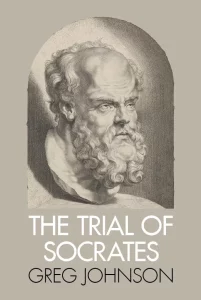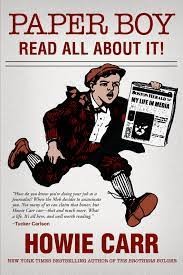Paper Boy:
The Life and Times of an Ink-Stained Wretch
Steven Clark
If Holden Caulfield did battle with the phonies, Howie Carr does it with hacks. Howie is a Boston journalist whose mischievous face is a combination of Jimmy Cagney and Mephistopheles, offering Irish bravado and tempting the reader, listener, or viewer — he’s done his act for all three — to see the facts and get angry. In Paper Boy, Howie’s memoir, there’s a lot to get angry about, but almost every page bristles with laugh-out-loud moments.
Howie was born in Maine, grew up in Miami, scooted back to New England when his father got a job at Deerfield Academy, and admits he was always in love with becoming a newspaperman. After working on his school paper, the Deerfield Scroll (his column was called Sports Carr), Howie went to the University of North Carolina, did his time on the college daily, then took a job at the Winston-Salem Journal, where he ruffled feathers while imitating his two journalistic idols, Tom Wolfe and Hunter S. Thompson.
Then, in January 1978, Howie started work at the Boston Herald American, a Hearst paper that was sinking in circulation but offering a street corner style of grit and wise-guy ambience that Howie craved. The Globe was the main Boston paper, but it was mostly staffed with snobs who only reluctantly deigned to report on gritty stories. It was a place for Harvard men and trust-fund babies. Howie, being 47% Irish, didn’t rate a place there, anyway.
Howie’s articles, columns, and the transcripts of his radio broadcasts offer a mix of The Front Page and Rush Limbaugh. If he is a shock jock, it’s because he shocks the public with the truth. His life as a newspaperman — an “ink-stained wretch,” as he describes the lifestyle — has been made standing up to the corrupt and effete, the spin doctors and Ideologues he calls hacks, and Boston, which he described as the hack-o-rama, was the perfect setting to vent his spleen. One breezes through this 327-page memoir with its stories of how Carr made it in the business. His prose is in-the-know: “I knew some people at the station didn’t like me, but after you work awhile at places like City Hall or the State House, on the visiting team so to speak, a few boo birds in the cheap seats don’t bother you too much.”
Howie’s bite is deep when describing political chicanery, a catalog of hack-o-rama worthy of Ambrose Bierce’s The Devil’s Dictionary. “Once you go hack you never go back,” Howie warns, and he especially unloaded on the Kennedys. Howie notes that Joseph Kennedy, as well as his son Jack, spent much more time in Miami than Massachusetts, and for the Kennedys, dime-store royalty and hackdom was an easy fit. People were expected to defer to them.
Howie recalls that in 1978 Joseph, Bobby Kennedy’s oldest son, was a hippie who couldn’t get into Harvard. When the boy needed an honest job feeding from the public trough, Bob Crane was the State Treasurer and had to offer it to Joe. As Howie describes it:
Crane was the most loyal of liegemen, and now the lord of the manor was telling him he was through.
It took me years to figure out why the Kennedys figured the Treasurer’s job . . . was theirs for the grabbing. They didn’t care about why Crane and all the rest of the state politicians so appreciated the power of the Treasury-control of the state pension system, the patronage in the new state lottery, and all the rest that would fall to Crane in the years ahead. No, as far as they were concerned, it was just an entry-level job (for Joe), as the Senate had been for Teddy.
Patrick Kennedy, one of the lesser breed farmed out to run for office in Rhode Island, was nicknamed “Patches” by Howie, taken from the 1970 single by Clarence Carter about a boy named Patches who must save his family. Then, a young journalist from The Weekly Standard used Howie’s tapes on Patches to launch a devastating attack on him. That journalist was Tucker Carlson.

You can buy Greg Johnson’s The Trial of Socrates here.
Paper Boy is a great compendium of Massachusetts politics, recalling The Last Hurrah. Howie notes the animosity Ray Flynn brought as Mayor because the upper-class Irish pols such as Billy Bulger and Kevin White — “two-toilet Irish,” as they were called — thought Flynn was a ham-and-egger: a mere street pol.
A deeper, almost fatal animosity arose when Howie took on Whitey Bulger, the Boston mobster, murderer, head of the Winter Hill gang, and brother of the establishment pol Billy Bulger. When Whitey said that “we got a fresh dumpster in back just waiting for [Howie],” it wasn’t just talk. Howie dug into Bulger’s life and discovered that he was running cocaine operations in Boston, and almost all of Whitey’s dealers had public sector jobs. He called Whitey’s crew “the hack gang.”
Billy Bulger also held a deep grudge against Howie, and was one of the Commonwealth’s strongest politicians. Bulger, despite having no experience in higher education, became President of the University of Massachusetts. In 1989 he was named in an extortion charge against a local developer who had paid $500,000 dollars to Thomas Finerty, an associate of Bulger’s, who then gave $240,000 of it to Bulger “as a loan.” Bulger wasn’t charged, but in 2003, after he was charged with being evasive about his fugitive brother’s whereabouts, he had to resign from the university. Bulger always referred to Howie as “this nut,” indirectly blaming him for his downfall.
The book’s savvy prose is entertaining, offering a foxhole view of journalism, but Howie also describes his transition from print to television and radio, with all the behind-the-curtains drama that the hacks in corporate media bestow upon their employees.
Howie liked it when the Herald came under control of Rupert Murdoch, who favored newspapermen over media talking heads. But the book depicts a continuing battle to survive amidst the constantly-changing world of producers and networks, as well as corporate buyouts — another form of hackery. Howie battled this long enough to become the independent producer he is today. While the world of radio, TV, and print seem very orderly and dignified on the surface, Howie shows that it is actually more like the movie Blue Velvet: the film opens on a pristine lawn and house, but beneath the grass we find a savage world of bugs making a meal of one other.
There are also heroes in Boston. One of Howie’s was Albert Leo “Dapper” O’Neil, a politician who served on the city’s Licensing Board, which controls liquor licenses. Dapper was outspoken and made for great copy. He had little patience for losers and hacks. Howie recalls a meet-and-greet Dapper attended in Charlestown near the projects. When an obese female townie heckled Dapper, he had finally had enough:
Finally, he turned around to face the hag. He got right in her face.
“Listen,” he said, “like my father used to say, I’m not in the shit business. I don’t give it and I don’t take it. And I’m sure as hell not gonna take any shit from a big fat fucking project rat like you.”
Howie Carr’s battle with the hacks in the media is a story that is equally absorbing, as are his sour views on said media: “60 Minutes isn’t journalism, it isn’t even close. 60 Minutes is cheap melodrama. Democrat soap opera . . . you’re not so much interviewed as cast, in a role.”
He laments that the world of print journalism that he grew up in is dead. He has made his way into the new world: television, then radio, and now he has ventured into independent production, where he believes the best hope for journalism lies, since it can allow journalists to keep their independence as well as offer them a fair deal. The Howie Carr Radio Network is entertaining, biting, and thoughtful, and Paper Boy is essentially a print version of the show. Unlike Rush Limbaugh, Howie is deeper and saucier because he’s well-read and takes advantage of his lifetime of reporting to full effect, making him a worthy successor to the darker purveyors of acerbic wit and observation such as Mike Royko (author of Boss, which exposed Chicago’s then-Mayor Richard J. Daley), Mark Twain, and H. L. Mencken.
The last part of Paper Boy is a frank endorsement of Trump. Carr writes:
What the left never understood about Trump supporters is that it’s not so much their blind loyalty for Trump himself, but for what he represents-his willingness to fight for Americans who work for a living. And almost as importantly, his determination not to take any crap from anybody.
This is an important point: Trump’s major sin s that he talks back to the hacks, which also explains their absolute rage — a rage easily passed onto the “deplorables.” Being one of those shut out of Massachusetts power circles, Howie understands this very well.
All readers, whatever their politics, will find Howie to be an avid storyteller, truth-teller, and a very funny diarist of American corruption and mendacity. If you’ve never heard Howie on the radio, you’re missing a lot, and Paper Boy brings that voice unsullied and bubbling to the page. It’s an exceptional read.
* * *
Like all journals of dissident ideas, Counter-Currents depends on the support of readers like you. Help us compete with the censors of the Left and the violent accelerationists of the Right with a donation today. (The easiest way to help is with an e-check donation. All you need is your checkbook.)
For other ways to donate, click here.
Paper%20Boy%3A%0AThe%20Life%20and%20Times%20of%20an%20Ink-Stained%20Wretch%0A
Share
Enjoyed this article?
Be the first to leave a tip in the jar!
Related
-
Get to Know Your Friendly Neighborhood Habsburg
-
Nowej Prawicy przeciw Starej Prawicy: Przedmowa
-
Race Recap
-
Stalin’s Affirmative Action Policy
-
Doxed: The Political Lynching of a Southern Cop
-
James M. McPherson’s Battle Cry of Freedom, Part 2
-
James M. McPherson’s Battle Cry of Freedom, Part 1
-
The Worst Week Yet: March 31-April 6, 2024

1 comment
Great article about a good man. Thank you, Mr. Clark.
I get the impression that Howie Carr is almost unknown outside of New England. It’s a shame.
Comments are closed.
If you have Paywall access,
simply login first to see your comment auto-approved.
Note on comments privacy & moderation
Your email is never published nor shared.
Comments are moderated. If you don't see your comment, please be patient. If approved, it will appear here soon. Do not post your comment a second time.